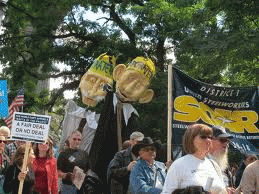The second of two articles on the history of the antiglobalization movement.
After Seattle, the antiglobalization movement grew by leaps and bounds. Over the next 20 months, large contingents of North American activists followed the economic elite to international summits all over the world. There were massive protests at the April 2000 meeting of the IMF/World Bank in Washington DC, the May 2000 meeting of the Asian Development Bank in Chiang May Thailand, the July 2010 Republican Convention in Philadelphia, the August 2010 Democratic Convention in Los Angeles, the World Economic Forum in Melborne in Sept 2000, the IMF/World Bank meeting in Prague in Sept 2000, George W Bush's inauguration (to protest his theft of the 2000 election) in January 2001, the third Summit of Americas Fair Trade of the America's Agreement (FTAA) meeting in Quebec City in April 2001, and the G8 Summit in Genoa in July 2001.
Antiglobalization activists also organized the first World Social Forum in Puerte Allegre Brazil January 25-30, 2001 -- as an alternative to World Economic Forum held in Davos Switzerland January 27 2001. In retrospect, this was the first split in antiglobalization movement, with 50,000 antiglobalization activists choosing to go to Puerte Allegro Brazil instead of protesting in Davos.
Then 9-11 happened and everything changed. The Patriot Act, which clearly was written in advance of the Twin Tower attacks, was passed virtually overnight, along with similar legislation in Canada. Many believe the antiglobalization movement, rather than potential Muslim terrorists, was the real target of the criminalization of dissent with the Patriot Act.
One for Our Side
In essence, we won the Battle of Seattle The US launched the Doha round of negotiations in 2002, hoping to capitalize on the worldwide sympathy and support they enjoyed following the 9-11 attacks. It didn't work. Third world countries continued to hold their ground -- mainly over US refusal to end agricultural subsidies. Negotiations on the Doha round broke down in Cancun in 2003 (in part, due to Korean farmer Lee Kyang Hae's public suicide), in Geneva in 2004, and in Hong Kong in 2005. The Doha round was officially suspended in 2006 following the breakdown of G-4 (Brazil, India, EU and the US) talks in Pottsdam. In 2007, more than 90 international non-profit organizations wrote their governments demanding an end to the Doha round and a two year moratorium on WTO Ministerial meetings. The moratorium was granted in November 2009, after the Geneva WTO Ministerial also ended in stalemate.
Yet the antiglobalization movement can only claim partial credit for dead-ending WTO negotiations before multinational corporations achieved their full menu of concessions. The WTO treaty is largely about allowing the industrial north preemptive rights in the developing south -- an agenda that has become meaningless with the increasing power and status of the "emerging" economies (the BRICS nations -- Brazil, Russia, India, China and South Africa). Even more important, the prior obsessive preoccupation with expanding international trade has been totally overshadowed by the crisis of international capitalism -- manifested in the global recession and debt crisis, resource depletion, catastrophic climate-related events, and the food crisis.
The Marginalization of the Antiglobalization Movement
In a parallel process, the antiglobalization movement also became largely irrelevant after 9-11, as antiglobalization activists shifted their focus to the antiwar movement opposing the invasion of Afghanistan and Iraq. The antiwar movement was subsequently co-opted by the Democratic Party, which enticed activists back to electoral politics, with their very seductive campaign to Defeat George Bush at All Costs.
Simultaneously there were major splits in the movement itself, with considerable activist energy being diverted from mass protests to the World Social Forum movement. The latter, as Australian political researcher Michael Barker has documented, seems to have major funding and support from CIA-linked left gatekeeping foundations (http://www.zcommunications.org/corporate-fronts-astroturf-groups-and-co-opted-social-movements-by-michael-barker).
The criminalization of dissent -- via the Patriot Act and similar legislation in other countries -- may have aggravated this split. Global capitalists have taken to meeting in remote locations (such as Davos, Switzerland), and employing a strong police and military presence to prevent protestors from influencing third world delegates. Demonstrators are deliberately caged off in "protest zones" remote from the actual conference site. This, along with arbitrary visa denials and preemptive arrests of activists based on their ideological beliefs, has substantially reduced the impact and effectiveness of these international protests.
Capitalists Never Sleep
Activists mustn't be lured into a false sense of security by the collapse of Doha. Globalization is very much alive and well. WTO tribunals continue to meet secretly in Geneva enforcing trade provisions that have already been agreed. Moreover after a two year hiatus, an informal meeting at the May G20 Summit in Paris has resulted in the scheduling of a WTO ministerial in Geneva in December 2011. The goal of the December meeting is to try to reach a "partial" agreement on the Doha round.
Even more ominous are efforts by corporately-controlled governments in the industrial north to coerce concessions out of smaller countries with bilateral "free trade" (see * definition below) deals that strip citizens of democratic rights and force African and Asian subsistence farmers off their land for the benefit of multinational agrobusinesses.
(Note: You can view every article as one long page if you sign up as an Advocate Member, or higher).






